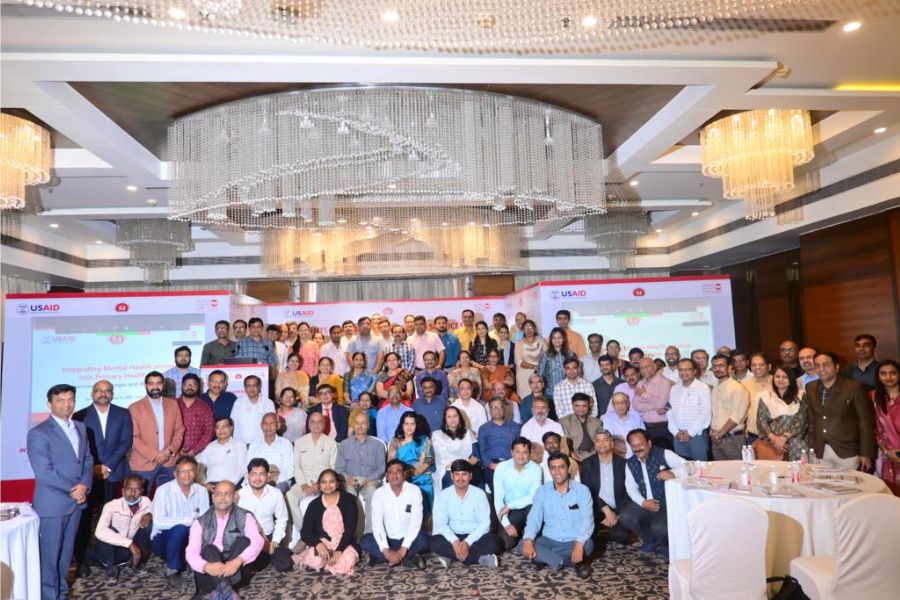World Health Partners held a stakeholder consultation in Ahmedabad on mental health and gender-based violence
Between June 2021 and December 2022, the project ran in seven different districts across the state to help people who had been affected by COVID-19 and gender-based violence

Advertisement
Ahmedabad : World Health Partners (WHP), a prominent public health organisation, discussed the lessons it had learned from its 18-month intervention (Comprehensively Addressing Mental Issues during the COVID-19 pandemic) on mental health and gender-based violence in seven districts of Gujarat during a presentation in Ahmedabad on February 15.
U.S. Agency for International Development (USSAID) funded the initiative. The Hospital for Mental Health in Ahmedabad lent its technical expertise to see the project through (HMHA). Attendees included Ms. Remya Mohan, IAS, MD – National Health Mission, Gujarat; Dr. Lavina Sinha, IPS, Deputy Commissioner of Police for Zone 1 in Ahmedabad; Dr. R. R. Vaidya, State TB officer; and Dr. Ajay Chauhan, State Nodal Officer, Mental Health.
“When we see such a drastic shift in circumstances so quickly, as the epidemic has done, everything goes for a loop. When countless lives are lost, jobs are lost, money is lost, and people miss out on activities and social relationships, it can be difficult to maintain a healthy mental and physical equilibrium. Because of these exceptional difficulties, we were able to interact directly with patients and their loved ones. Together, with our help, they were able to shed their burdens,” stated Prachi Shukla, Country Director of Global Health Partners. More than 80,000 COVID patients in Gujarat were screened and counselled with the help of a combination of on-the-ground workers and a call centre supported by cutting-edge technology. Due to its adaptability and use of inexpensive technology, this model may be quickly scaled by state governments.
Between June 2021 and December 2022, the project ran in seven different districts across the state to help people who had been affected by COVID-19 and gender-based violence get access to early screening, referral, and social security links. These seven municipalities include Ahmedabad, Gandhinagar, Mehsana, Kheda, Patan, Vadodra, and Surat.
Key highlights:
- The project reached out to more than 1,75,000 people in Gujarat using the Patient Health Questionnaire-4 (PHQ-4) screening tool to assess their mental health status
- During the project duration, WHP’s tele-health platform received more than 23,000 calls for mental health support
- As per the data from WHP’s helpline, 16% COVID-19 patients were identified having mental health issues. It also highlights that 5% family members of COVID-19 patients also reported having mental health issues
- Anxiety and depression were found to be most prevalent disorders (92%) among COVID-19 affected patients facing mental health challenges.
- 82% of MH affected COVID-19 patients who called on WHP’s helpline no. had mild mental health issues (anxiety and depression) while 93% MH affected COVID-19 patients showed anxiety and depression symptoms at the household level screening
- 82% persons with mild mental health issues were found to be normal after completing the tele-counselling sessions
- A strong linkage was established between gender-based violence issues and mental health. 83% of gender-based violence affected individuals were found to have mental health issues.
- WHP also facilitated referral services for those in need of institutional care. More than 524 persons for mental health, gender-based violence and substance use disorder, were referred for institutional care
- During the project, WHP promoted access and linkages to various social security schemes for the most affected. More than 500 beneficiaries directly benefited with these linkages. More than INR 24 lakh was deposited in the bank accounts of COVID affected people as part of the ex-gratia assistance provisions of the state govt.
Emphasising on the need for community participation, Dr. Ajay Chauhan, Member Secretary at the State Mental Health Authority Gujarat, said, “WHP along with the state mental health department are extensively working in identifying TB, & COVID patients, substance use and GBV affected patients with mental health issues, as well as providing tele-counselling to mild patients and severe patients are referred to District Mental Health Institute. The pandemic has shown that multi-sectorial collaborations is extremely important to bring about community awareness on early identification, prevention and management of mental health through effective linkages and services.”
Insights from the project show that tele-medicine has been increasingly acknowledged as a viable system to widen access to provide mental health care and support. World Health Partners’ strong community presence together with recent government initiatives like Tele-MANAS can accelerate a positive momentum in care seeking behaviour and building resilient mental health support systems.
World Health Partners (WHP) is a non-profit Indian society that sets up programs to bring sustainable healthcare within easy access to underserved and vulnerable communities. For more details, please visit: www.worldhealthpartners.org .
Advertisement

